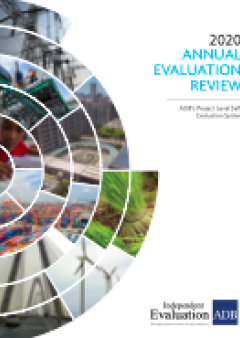
2020 Annual Evaluation Review: ADB’s Project Level Self-Evaluation System
This year’s AER notes a decline in the performance of sovereign projects in the 2017–2019 review period which deviates from an improving trend since 2010–2012. The sustainability in results of ADB operations continues to be weak, affecting most of the projects that were evaluated as not successful. Measures to promote sustainability must be incorporated into project designs, such as instituting asset management systems, dedicating funds for operation and maintenance from government budgets, and undertaking public financial management reforms. The performance of nonsovereign operations continued its declining trend during the review period. This is a concern that needs to be addressed since Strategy 2030 envisages private sector operations becoming more prominent in ADB operations.
This year, the AER conveys some key high-level reflections on the use of ADB’s lending modalities, based on a series of recent thematic and corporate evaluations. The multitranche financing facility, and policy and results-based lending have contributed to improvements in processing efficiency and mobilizing cofinancing resources. While ADB’s various financing modalities are well suited to supporting Strategy 2030’s agenda, in order to fully harness their benefits, greater synergy between project and policy operations, organizational strengthening, and improved staff incentives and training on the use of the modalities are needed.
The special theme of this year’s AER is the robustness and credibility of ADB’s project self-evaluation system. This system plays a vital role in tracking ADB’s progress and performance in meeting its mission and the new agenda set in Strategy 2030. The robustness and credibility of ADB’s project self-evaluation system was assessed based on how the reliability, timeliness and usefulness of the information it generates supports accountability, learning and decision making. The assessment found the architecture of ADB’s project self-evaluation system to be robust, credible, and useful for accountability and learning. Still, weaknesses particularly concerning data reliability, data management, institutional capacity and guidance in the use of the system need attention. There are few incentives to capture tacit knowledge throughout the project cycle. In the case of nonsovereign operations, a formal and comprehensive monitoring system, well linked to the evaluation system for projects is not yet in place, hindering the systematic tracking of performance, results and lessons. With greater attention to training, data management, incentives, guidance, and resources devoted to monitoring and evaluation, the project self-evaluation system of sovereign and nonsovereign operations, can be improved.
The impact of IED’s recommendations contained in higher level evaluations depends on the quality of Management’s action plans in to implement these recommendations and the extent to which the plans are executed. IED’s assessments indicate that only 75% of actions in response to recommendations were either fully or largely implemented. The shortfalls in implementation are generally due to a lack of alignment between actions and recommendations, and the actions not being specific about intended outcomes—both of which can be improved through better engagement between Management and IED at the action plans formulation stage.
